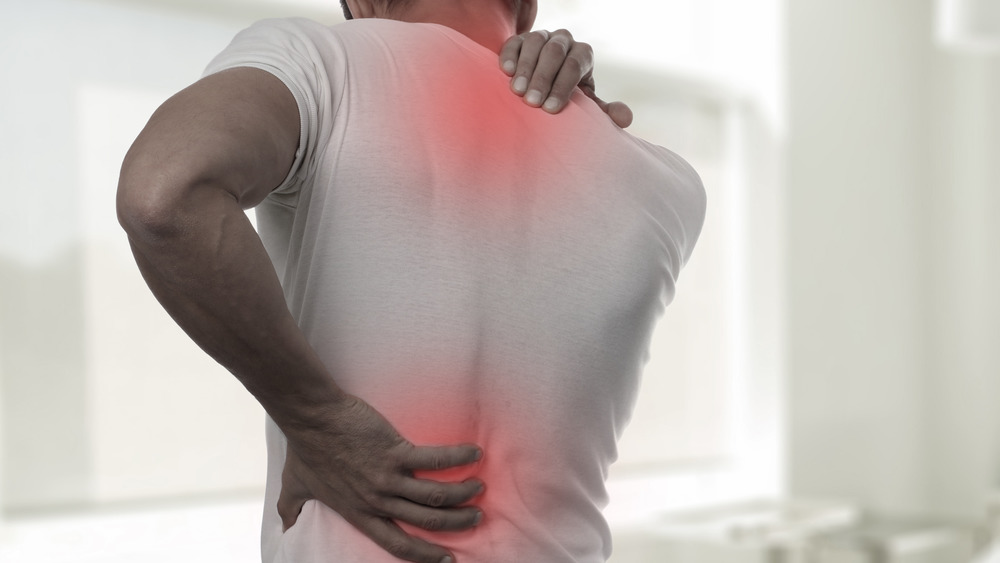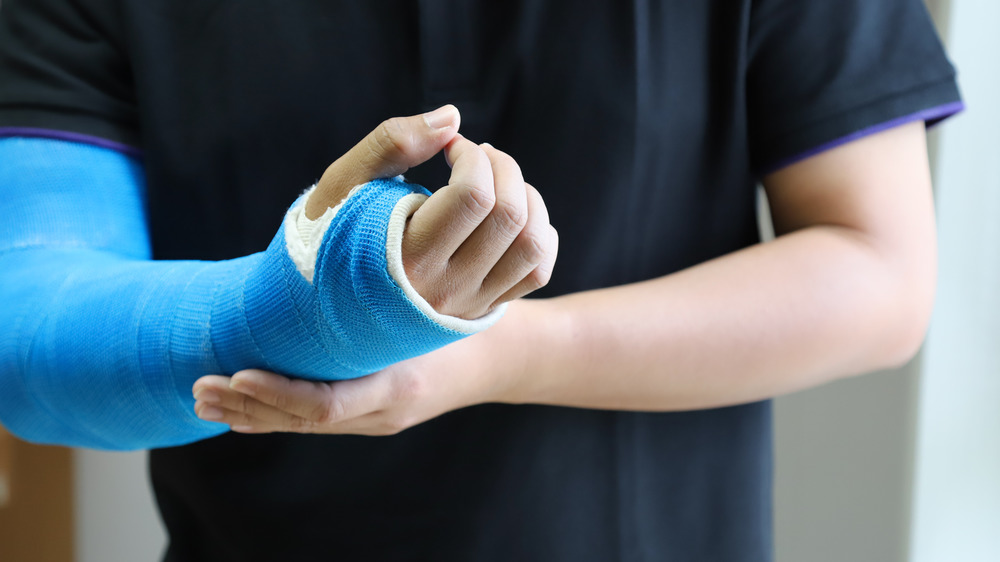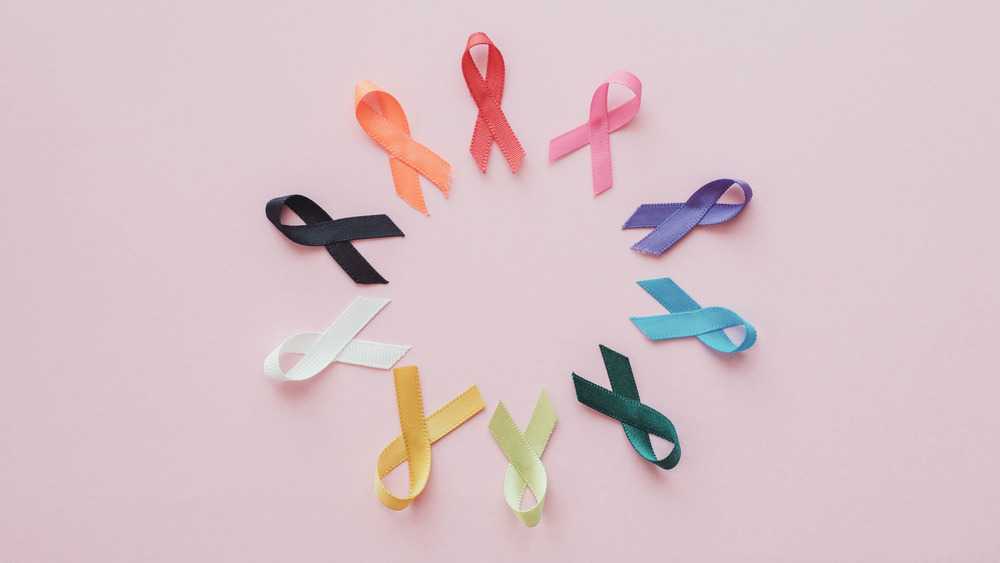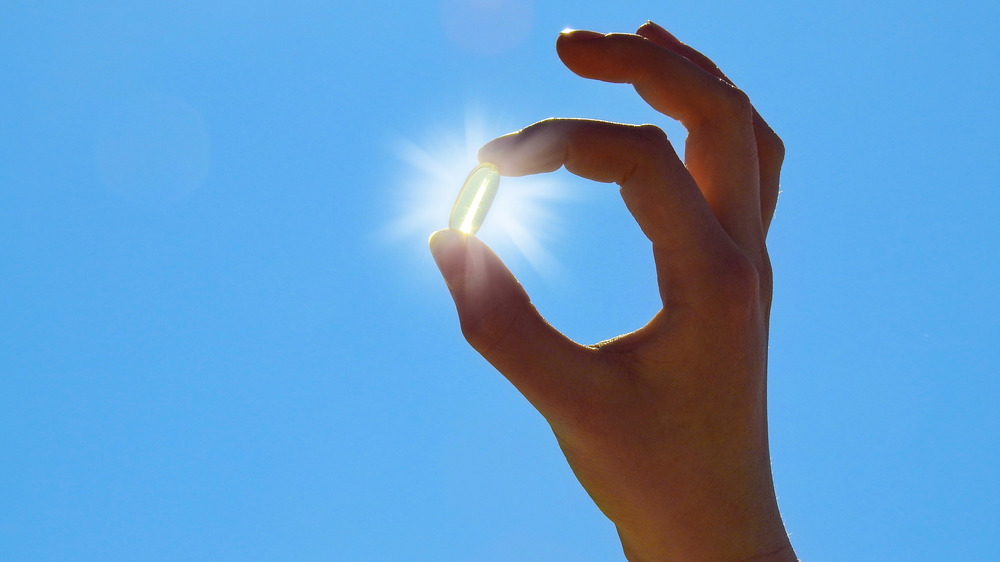You're Not Getting Enough Vitamin D If This Happens To Your Body
Vitamin D (aka the sunshine vitamin) is an important fat-soluble vitamin that plays many roles in our body. According to a report published in the Journal of Pharmacology & Pharmacotherapeutics, insufficient intake of vitamin D impacts around 50 percent of the population worldwide. Very few foods contain vitamin D, but it is fortified in certain foods including milk and breakfast cereal. That leaves the main vitamin D source: the sun.
When exposed to direct sunlight, your body creates vitamin D, which is why it's dubbed the "sunshine" vitamin. The National Institutes of Health explained that is can be difficult to get enough vitamin D from UV rays, as cloudy days and shade limit sun exposure.
Nevertheless, vitamin D is needed to support your muscles, bones, nerves, and immune system. It even helps absorb other certain nutrients which are all impacted when you are deficient. Here's a look at how much vitamin D you need, as well as some side effects you may notice when your vitamin D intake is lacking.
How much vitamin D do you really need?
Vitamin D needs vary. Average daily recommended amounts are usually in either micrograms (mcg) or International Units (IU). National Institutes of Health states that people between the ages of one to 70 need at least 600 IU (15 mcg). On your 71st birthday, that recommended amount increases to 800 IU (20 mcg). This is because your skin can't make vitamin D as efficiently when you are older.
Overdoing it on vitamin D can result in toxicity that brings nausea, vomiting, weakness, and weight loss. To avoid this, the daily upper limit is set at 2,500 to 3,000 IU (63 to 75 mcg) for children aged one to eight, and 4000 IU (100 mcg) for children older than nine and adults. Most of the time, excessive vitamin D comes from supplementation, as our body limits the amount of vitamin D produced even when out in the sun for long periods of time.
The best way to measure the amount of vitamin D in your body is to get a blood test. Levels that fall below 30 mmol/L (nanomoles per liter) are much too low for bone or overall health, and levels above 125 nmol/L are too high. A sufficient level for most people is 50 nmol/L or above.
Getting sleepy? You may need to get more vitamin D
You're hitting your eight or more hours of sleep every night, but you're still feeling tired throughout the day. Although fatigue can be caused by many different things, your vitamin D levels may be to blame.
A 2015 report in Springerplus discussed a 61-year-old man who was dealing with excessive daytime fatigue. After testing, no abnormalities were found in hormone levels or thyroid. He didn't have sleep apnea or other conditions that could be creating fatigue. However, lab results did show that his vitamin D levels were low (18.4 nanograms per milliliter). After vitamin D supplementation was initiated, the patient's daytime sleepiness subsided.
A study published in the North American Journal of Medical Sciences found that otherwise healthy individuals may be feeling fatigue from insufficient vitamin D due to its impact on reduced "functioning of skeletal muscles via vitamin D receptors." The study found that 77.2 percent of patients reporting fatigue had low vitamin D levels. After five weeks of vitamin D treatment, symptoms of fatigue improved significantly.
If you get sick frequently, you may not be getting enough vitamin D
Your immune system is what helps battle those pesky colds and viruses that raid your body. When it's strong and healthy, you lower the frequency, severity of symptoms, and the duration of illnesses. Although one of vitamins D's main roles includes bone health, it can also be a companion to our immune system. According to a 2011 report published in the Journal of Investigative Medicine, vitamin D can be in control of various immune responses, and a deficiency leaves us susceptible to infection.
In fact, research has even shown that vitamin D deficiency may be correlated with COVID-19 infection. A 2020 study published in JAMA Network Open oversaw nearly 500 patients who had their vitamin D levels measured in the year before COVID-19 testing. The results found that patients with a vitamin D deficiency status had a 1.77 times higher risk of testing positive for COVID-19.
You may need more vitamin D if your back and other bones feel achy
One wrong move and back pain can haunt you for weeks. Sometimes though, no evidence of injury or disease are showing. You can thank the lack of vitamin D for that. Vitamin D is important for calcium absorption and bone health; without it, bones can become soft, which leads to pain.
Stewart B. Leavitt, author of a peer-reviewed report on back pain and vitamin D, told Rejuvenation Science, "Our examination of the research, which included 22 clinical investigations of patients with pain, found that those with chronic back pain almost always had inadequate levels of vitamin D." He went on to add, "When sufficient vitamin D supplementation was provided, their pain either vanished or was at least helped to a significant extent."
The report found that out of 360 individuals, all had inadequate levels of vitamin D and were experiencing back pain. After three months of vitamin D treatment, symptoms improved in 95 percent of the patients. A study published in BMC Musculoskeletal Disorders demonstrated similar findings. Participants who had low levels of vitamin D experienced more back pain, increased severity of back pain, limitations in daily activities, and more fractures.
You may need more vitamin D if you start to feel the blues
Depression is a condition that impacts millions of people worldwide. A report published in Issues in Mental Health Nursing revealed that 121 million people are affected by depression in the world, and around 14.8 million people in the United States. Treatment for depression typically includes antidepressants and psychotherapy, which tends to be successful 60 to 80 percent of the time.
The same report explained that vitamin D deficiency may play a role in depression, and that it could also play a supplementary role in the treatment of depression, although more research needs to be done. The trigger of this belief: Groups who are at risk of vitamin D deficiency (elderly, adolescents, obese individuals, and those with chronic illness) are also the same groups that are at risk for depression.
A meta-analysis published in The British Journal of Psychiatry wanted to settle the conflicting evidence of the relationship between vitamin D and depression. Results found that low vitamin D concentrations were very much associated with depression, but further studies should be completed on whether vitamin D supplementation can help with the prevention or treatment of depression.
If your cuts are slow to heal, you may need more vitamin D
We need proper nutrients for many reasons, wound healing being one of them. Vitamin D, in particular, is required in higher amounts when dealing with a cut, according to a report published in Advances in Skin & Wound Care. The skin needs more vitamin D because it helps to protect against infection and begins the repair process.
A study published in the Evangelical University of Curitiba sought to understand the relationship between vitamin D deficiency and wound healing. The study consisted of 26 patients with leg ulcers and the same size control group without ulcers. Testing showed the individuals who had ulcers on their legs were deficient in vitamin D compared to the group that didn't have ulcers.
The same study also divided the ulcer group into two sections, treating half with a placebo and the other half with vitamin D for two months. Those who were in the vitamin D treatment group saw their ulcers decrease over time while the placebo group didn't have a very significant change to their ulcers.
Hair loss could be a sign of needing more vitamin D
Although not many people would complain about body hair loss, losing it from the top of your head is another story. Vitamin D deficiency has been linked up with a condition called alopecia, which is also known as spot baldness. A study published in The Israel Medical Association Journal confirmed this relationship between vitamin D and alopecia after finding a group of patients with alopecia who had significantly decreased vitamin D levels. Serum vitamin D levels 30 ng/ml or lower were associated with this condition.
Vitamin D stimulates new and old hair follicles, according to Healthline, therefore limited amounts of vitamin D can prevent new hair growth. More research needs to be done, especially on human subjects, but a report in the Dermatology Online Journal revealed that the data from animal studies shows vitamin D receptors play an important role in hair follicle cycles, especially during the anagen phase. That phase is the active or "growing" phase of the hair growth cycle.
Having muscle pains? Consider upping your vitamin D intake
That unpleasant feeling of muscle aches and pains can really make a good day go bad, especially when it limits your movement. A report published in The Journal of Neuroscience stated that musculoskeletal pain affects almost 50 percent of all adults, and the majority of such ones have a vitamin D deficiency. It's believed that low levels of vitamin D creates muscle hypersensitivity due to the impact on sensory nociceptor neurons (pain receptors).
A case series published in The Permanente Journal followed four individuals who dealt with chronic pain, mainly in the neck and back areas, lasting six months to one year. All patients were deficient in vitamin D, some more than others, with the levels ranging from 15 to 27 ng/mL. Each person was given 50,000 IU of vitamin D once per week for 12 weeks. The outcome? The patients experienced "more than 70% improvement in their symptoms," including reduced muscle spasms and overall pain.
Brittle bones may mean you are not getting enough vitamin D
Vitamin D is necessary for calcium to be absorbed. It's no surprise, then, that inadequate amounts of vitamin D lead to weak, soft, and brittle bones. According to The American Orthopaedic Foot & Ankle Society, supplementing vitamin D can help to decrease risk of fractures in many parts of your body including the foot, ankle, hip, and wrists. Not only can vitamin D prevent these issues but, when you're already dealing with a fracture, it may also help the healing process.
Studies have shown that vitamin D paired up with calcium supplementation can be even more beneficial to preventing fractures. A meta-analysis published in JAMA Network Open found that daily doses of 400 to 800 IU of vitamin D and 1000 to 1200 mg of calcium reduced risk of any fractures by 6 percent and reduced risks of hip fractures by 16 percent. Getting in enough calcium and vitamin D also helps to reduce your chances of developing osteopenia (low bone mass) and the condition it leads to, osteoporosis (very weak and brittle bones).
Beyond bone health, the combination of calcium and vitamin D is also important for "muscle movement" and "nerve communication," Johns Hopkins Medicine explained.
Could a vitamin D deficiency be affecting your heart health?
According to a report published in Clinical Hypertension, vitamin D has been linked with multiple cardiovascular risk factors including diabetes, obesity, and hypertriglyceridemia (elevated triglycerides).
Harvard Health explained that although low blood levels of vitamin D has been linked with a higher risk of heart disease, there is non-conclusive research on whether taking vitamin D supplementation can lower that risk. Dr. JoAnn Manson, a professor of Medicine at Harvard Medical School and chief of preventative medicine at Brigham and Women's Hospital in Boston, told the American Heart Association, "There is some promising research that vitamin D may reduce the risk of heart failure, and that requires additional research." She went on to add, "However, the evidence to date is that moderate to high vitamin D supplementation does not appear to reduce the risk of heart attacks or strokes." As such, further research is needed.
It's also important to note that vitamin D, in excess, can also cause cardiovascular problems. Manson noted that "very high doses of supplementation could increase the risk of blood vessel calcification and could actually have adverse effects." She continued, saying, "So, an important principle is that more is not necessarily better, and in fact, mega-dosing on vitamin D can have some harmful effects."
Low levels of vitamin D can increase your cancer risk
Vitamin D has the potential to protect you from certain cancers. When you're deficient, that unfortunately means you may be at a higher risk. According to the National Cancer Institute, early research showed that individuals living in areas south of the equator, where levels of sunlight exposure were high, had lower incidences and death rates for certain cancers. Further research has shown vitamin D has the potential of slowing or preventing the development of cancer by "promoting cellular differentiation, decreasing cancer cell growth, stimulating cell death (apoptosis), and reducing tumor blood vessel formation (angiogenesis)."
This is, however, a double-edged sword. It's not recommended to increase your exposure to sunlight to get more vitamin D as this also increases your risk of skin cancer. Even wearing sunblock prevents your body from fully absorbing the sunlight's ultraviolet rays and therefore prevents vitamin D to be created in your body. Instead, focus on eating food fortified with vitamin D, such as milk, juices, and breakfast cereals.
If you didn't get enough vitamin D as a child, your growth may have been stunted
Vitamin D is associated with conditions that affect the normal development and maintenance of our skeleton, according to a 2013 report published in BioMed Research International. As children, we're constantly growing and our bones are continuously developing. Without enough vitamin D in childhood, though, a condition called rickets occurs, which is the softening and weakening of bones in children. This can also create low levels of calcium and phosphorus because vitamin D promotes the absorption of these nutrients.
Boston University School of Public Health cited a study that found over 79 percent of children with low levels of vitamin D had stunted growth. Underweight children were two times as likely to have low vitamin D levels, and boys were 1.6 times more likely to be stunted than girls.
Rana Mokhtar, public health researcher and the lead author of this study, told the univeristy, "The effect of vitamin D in improving growth parameters in children beyond the scope of rickets has largely been overlooked, even though there is a clear mechanism of action for vitamin D's effect on skeletal growth."
You may be more — or less — prone to vitamin D deficiency than others
Some of us are at higher risk of a vitamin D deficiency than others. MedlinePlus explained that people who are older, have darker skin, or certain diseases or chronic conditions have an elevated risk of developing a deficiency. As we get older, our skin doesn't make vitamin D when exposed to the sun as well as it did when we were younger. Our kidneys are also less capable of converting vitamin D into its active form. Darker skin also "has less ability to produce vitamin D from the sun."
Additionally, vitamin D needs fat to be absorbed in the body. Obesity, however, can prevent that since vitamin D will bind with body fat and not make it into the blood. People with conditions such as Crohn's disease or celiac disease are also at risk for deficiency. They typically can't handle eating fatty foods, which will then affect the absorption of vitamin D. Gastric bypass surgery, chronic kidney or liver disease, and certain medications can also prevent vitamin D from being normally absorbed into the body.














